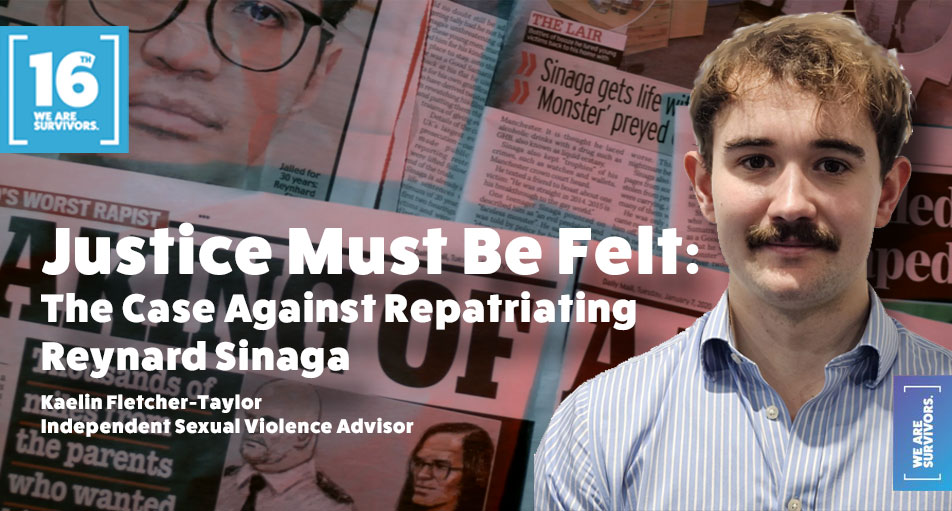Journal
Back
Justice Must Be Felt: The Case Against Repatriating Reynard Sinaga
by Kaelin-Fletcher Taylor
“Justice must not just be done but must be seen to be done.” It’s a phrase heard in chambers and classrooms alike. I wouldn’t blame anyone for finding it a pompous, albeit pithy, phrase – as if the speaker stopped short of adding, “…to keep… certain papers… off our backs.”
Of course, there is truth in this. No matter how unified the legal profession is on any given decision, it means little if it cannot be understood by a layman. We need only look to the last decade, littered with cases where the legal profession has been cast as out of touch, at odds with public sentiment, and thrust into the firing line as a result.
However, I would suggest an alternative reading of every lawyer’s favourite maxim. It is a reminder that courtrooms are not mere battlegrounds of intellectual sparring, nor are trials a platform for professional posturing. It is a reminder that criminal trials must appear fair because someone has been harmed.
So, perhaps, instead of an addition, the phrase needs an edit:
“Justice must not just be done but must be felt by those affected.”
Nowhere is this more relevant than in the recent suggestion by Indonesia’s senior minister for law and human rights affairs, Yusril Ihza Mahendra, that Reynard Sinaga – Britain’s most prolific convicted rapist – should be returned to his native Indonesia to complete his sentence.
Survivors need to see justice being served. With no indication of how Sinaga’s sentence would be enforced under a foreign legal system, any sense of closure survivors may have found in his incarceration is now being swiftly pulled from beneath them.
The Case for Repatriation?
There are arguments for returning foreign offenders or ensuring the return of our own. In theory, there are practical benefits, such as reducing the financial burden on the host country, allowing individuals to serve sentences closer to their families, ensuring their rights are adequately protected, and fostering international cooperation. However, in serious cases like this, repatriation must be weighed against justice, and here, the usual justifications do not hold up.
Cost
Prisoner transfers are often justified on economic grounds, with the average cost of incarceration in the UK around £50,000 per year. This is a reasonable argument, and I understand the urge to improve the public finances, but cost-saving arguments fall apart when weighed against the risks of repatriation. Transferring Sinaga would mean surrendering oversight of his sentence away from the UK and the cautious eyes of survivors to a foreign legal system, where the terms of his imprisonment are far from guaranteed. Justice is not an item on a budgetary line, and the survivors should not be forced to foot the bill.
To also make myself abundantly clear, although I have mentioned a ‘foreign legal system’ and the costs involved, to conflate Sinaga’s case with broader debates on asylum and border control is a false equivalence (Sinaga was on a legitimate student visa). This is not an immigration issue, and any attempt to frame it as one is to distract from the real question of justice for survivors.
Extremism & Human Rights
Another frequent justification for repatriation is the concern that a prisoner may radicalise others in custody. This has historically applied to figures like Abu Qatada, a Jordanian cleric arrested in the UK in 2002 under anti-terrorism laws. After a prolonged legal battle over the risk that he might face torture if deported, he was eventually returned to Jordan in 2013. His case demonstrated the complexities of balancing national security with human rights obligations.
But this only reinforces why Sinaga’s case is different. He poses no radicalisation risk, nor would his continued imprisonment in the UK violate human rights laws. In short, and unlike many other repatriation cases, this is a decision that need not be made.
Prisoner Exchange
As already listed briefly above, there are a range of reasons why the UK Government would want to repatriate British offenders currently in Indonesia, and a prisoner swap may be the result of any deal. However, to succumb to the usual logic behind repatriation is to miss the point.
This is a discussion unfolding in the media rather than in court. There is no transparency on who would be exchanged and under what conditions. Five years after the first trial and without the support they would have had in place at the time, survivors have been left to grapple with speculation rather than with the concrete legal reassurances they believed were secure.
When discussing justice, the rights of survivors should not feel like collateral in broader diplomatic negotiations. This is a conversation that concerns them, that is happening without them, and that they are powerless in. To repatriate Sinaga and enforce such silence upon the survivors is to retraumatize them once again.
Justice Must Be Felt
Reynard Sinaga was convicted of drugging and raping 48 men, though police believe the true number of victims exceeds 200. These are crimes of rare and appalling baseness. I cannot help but speculate upon the outcome if this case fitted more neatly within the boundaries of tabloid outrage. If this were a terror offence with over 200 people impacted, if Sinaga were of a different ethnicity, or perhaps, if the victims had just not been male, then any prospect of early release, whether through repatriation or otherwise, would surely not just be politically unviable but a moral impossibility.
In the absence of that outrage, we must ensure that justice is still felt by the survivors.
[Originally posted on LinkedIn]
















